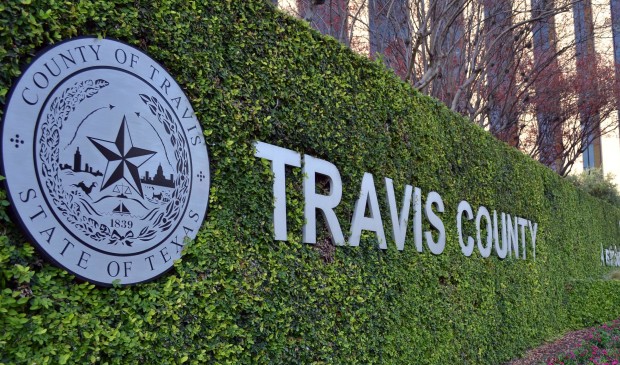County looks at legal community for public defender office task force
Wednesday, October 17, 2018 by
Ryan Thornton Using data from the Planning and Budget Office and the Justice Planning Department, the Texas Indigent Defense Commission recently studied the feasibility and benefits of having a public defender office in Travis County.
Geoff Burkhart, executive director of TIDC, presented the study’s recommendations to the Travis County Commissioners Court Tuesday morning, with a strong preference for the creation of a public defender office.
The provisional proposal based on the TIDC study suggests an office combining the existing Mental Health Public Defender Office, Juvenile Public Defender Office and Office of Parental Representation with an additional 66 employees, including 48 attorneys. The proposal anticipates an additional $106,000 in annual costs to the county accompanying TIDC grant funding during the first four years and an additional $3.5 million in costs after TIDC funding expires.
“In the 1970s, Travis County was a big-time leader when it comes to indigent defense, creating the Juvenile Defender Office here. And I think with the steps we’re talking about taking, that can happen again in Travis County,” said Burkhart.
The Capital Area Private Defender Service currently handles all adult felony and misdemeanor cases in Travis County, making it one of the largest counties in the nation without a public defender. While CAPDS, a joint venture nonprofit corporation, currently serves the indigent in the capacity required by the 1963 ruling of Gideon v. Wainwright, a study conducted earlier this year found that in Travis County drug possession cases, defendants with court-appointed lawyers were nearly twice as likely to be convicted than defendants able to hire their counsel, suggesting a lack of quality defense for the indigent.
According to the TIDC study, a public defender office provides a variety of unique benefits to the county, clients and attorneys. Burkhart cited, among other benefits, compliance with national standards, annual budget predictability, clear division of tasks among office employees and more consistent quality due to supervision.
Exclusive reliance on the private bar has led, according to Burkhart, to an imbalance in the criminal justice “three-legged stool” of prosecution, judiciary and defense. With prosecution and judiciary representing the first two legs, he said defense, “that third leg of the stool,” is not carrying its weight.
In addition to numerous cited benefits of a public defender office, Burkhart and others emphasized the need to relieve a portion of the burden from the defense attorneys currently taking on all cases in Travis County. More than any inherent weakness of the private bar, it is the overwhelming number of cases paired with the financial incentive to accept a plea bargain that leads to poor representation.
“Those core tasks I talked about – investigation, legal research, client communication and filing motions – all of that goes out the window when you have too many cases, and you start to see a little bit more of a meet-and-plead type of environment, where people are pleading out before an attorney’s had an opportunity to do that core work,” Burkhart said.
Defense attorneys can earn the same amount of money whether their defendant accepts a plea bargain or if the case is dismissed, with the first often taking only a fraction of the time as the latter. Effectively, if a plea bargain is quickly accepted, a defense lawyer’s hourly wage increases dramatically. If too many cases are piling up for attorneys, there is even greater incentive to swiftly reach a plea deal.
As a remedy, TIDC suggests a public defender office to take over 30 percent of Travis County cases – enough to keep attorneys and other employees busy but not so much as to pressure them to rush cases. For regional reference, the public defender office in Dallas takes about 50 percent of cases, while that in Harris County handles just under 9 percent of cases.
This solution, however, was not universally accepted. Steve Brand, speaking on behalf of the Austin Criminal Defense Lawyers Association during public hearing, asked the court to delay any decisions to allow for ACDLA to analyze the findings and advise the committee with their comments. Brand specifically raised the question of why CAPDS is not being reinforced with more funding instead of creating a new office to manage the number of cases.
“We’re talking about just completely scrapping one program and moving into the other. What we should look at, in part, is if those resources might be better spent in their organization,” said Brand in reference to CAPDS.
The proposal also recommends creation of a working group consisting of legal professionals in the county. The commissioners welcomed Burkhart’s comments and sought to move forward with a working group to consider first steps.
County Judge Sarah Eckhardt said she would send out the charge for a diverse working group via the Commissioners Court bulletin board and email this week.
The Austin Monitor’s work is made possible by donations from the community. Though our reporting covers donors from time to time, we are careful to keep business and editorial efforts separate while maintaining transparency. A complete list of donors is available here, and our code of ethics is explained here.
You're a community leader
And we’re honored you look to us for serious, in-depth news. You know a strong community needs local and dedicated watchdog reporting. We’re here for you and that won’t change. Now will you take the powerful next step and support our nonprofit news organization?











